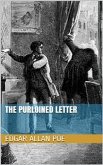The unnamed narrator is discussing with the famous Parisian amateur detective C. Auguste Dupin some of his most celebrated cases when they are joined by the Prefect of the Police, a man known as G—. The Prefect has a case he would like to discuss with Dupin. A letter has been stolen from the boudoir of an unnamed female by the unscrupulous Minister D—. It is said to contain compromising information. D— was in the room, saw the letter, and switched it for a letter of no importance. He has been blackmailing his victim. The Prefect makes two deductions with which Dupin does not disagree: The contents of the letter have not been revealed, as this would have led to certain circumstances that have not arisen. Therefore, Minister D— still has the letter in his possession. The ability to produce the letter at a moment's notice is almost as important as actual possession of the letter. Therefore, he must have the letter close at hand.









